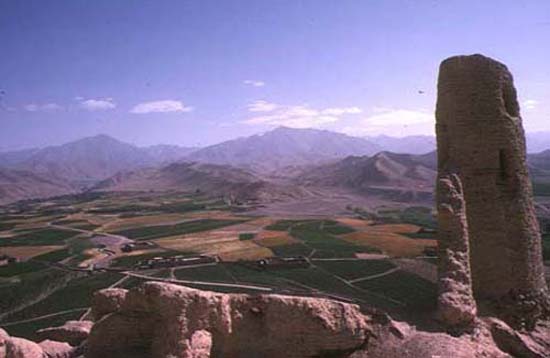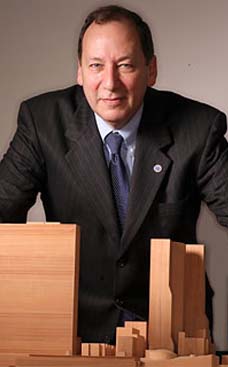
With this year's escalation of warfare on both sides of the border, Pakistani, Afghan and U.S. officials have spoken of the need to pursue political and military solutions to the Taliban insurgencies. The renewed effort at talks comes as Pakistan's army has stepped up its offensive against militants in the Swat Valley and the border region of Bajaur following Taliban takeovers in those areas. U.S. Defense Secretary Robert Gates said Oct. 7 he favors talks with "reconcilable'' guerrillas in Afghanistan who might be persuaded to lay down arms. Taliban in Afghanistan say they won't negotiate until the U.S.-led NATO troops backing the government are withdrawn. Journalist James Rupert, head of Bloomberg's international bureau in Islamabad, Pakistan began his career abroad as a Peace Corps volunteer, teaching mechanics and welding in Morocco.
James Rupert writes: Pakistani, Afghan Leaders Urge New Talks With Taliban Fighters
Pakistani, Afghan Leaders Urge New Talks With Taliban Fighters
By James Rupert
Oct. 29 (Bloomberg) -- Pakistani and Afghan officials as well as tribal leaders vowed to redouble efforts to persuade Taliban guerrillas and other militants to stop fighting against the two nations' governments.
Fifty delegates from the two countries, meeting in Islamabad the past two days, decided to appoint "contact groups'' to make direct appeals in the next two months to militants fighting along the border. The Taliban and their allies have rejected such entreaties in the past year, and the two delegations cited no new offers to persuade the militants.
"It's another opportunity,'' Abdullah Abdullah, head of the Afghan delegation and the country's former foreign minister, said at a press conference yesterday. "Hopefully it will bring some results.''
With this year's escalation of warfare on both sides of the border, Pakistani, Afghan and U.S. officials have spoken of the need to pursue political and military solutions to the Taliban insurgencies.
The renewed effort at talks comes as Pakistan's army has stepped up its offensive against militants in the Swat Valley and the border region of Bajaur following Taliban takeovers in those areas.
U.S. Defense Secretary Robert Gates said Oct. 7 he favors talks with "reconcilable'' guerrillas in Afghanistan who might be persuaded to lay down arms. Taliban in Afghanistan say they won't negotiate until the U.S.-led NATO troops backing the government are withdrawn.
Petraeus to Visit
"It remains to be seen if some of these extremist forces are going to be willing to renounce violence and become part of a peaceful, stable, productive Afghanistan,'' Defense Department spokesman Bryan Whitman said yesterday during a briefing at the Pentagon.
The new U.S. military commander for the region, Army General David Petraeus, is due to visit both countries next week.
A classified White House assessment of U.S. strategy in Afghanistan includes a draft recommendation to engage some Taliban members, excluding top leaders, the Wall Street Journal reported yesterday, citing unidentified Bush administration officials.
Petraeus used a similar approach in Iraq, enlisting Sunni tribesmen in the fight against al-Qaeda.
Afghan Reconciliation
While the Afghan government would make decisions regarding talks and would lead them, the U.S. supports the country's efforts at reconciliation, said State Department spokesman Robert Wood. Afghan officials say militants would have to renounce violence and ties to al-Qaeda, and pledge allegiance to the Afghan constitution, he said.
"What's really important here is that the Afghans come together and reconcile,'' Wood told reporters in Washington yesterday. "In the end, that's what's going to bring about a solution to the conflict in Afghanistan.''
The department has said its strategy review will look at how to counter the narcotics trade and help rebuild infrastructure and institutions at the local level.
"We're looking at a wide range of aspects of our policy to try to improve our ability to battle extremism in Afghanistan and help the Afghans do their jobs as well,'' Wood said.
The Islamabad conference comes after a larger peace conference hosted in the Afghan capital last year by President Hamid Karzai. The follow-up gathering, meant to build momentum for discussions with militant groups, was postponed during 10 months of political turbulence in Pakistan that ended with last month's election of President Asif Ali Zardari.
Trading Blame
Since elections in February, Pakistan's parliament and cabinet, led by Zardari's Pakistan Peoples Party, have said they are pursuing dialogue with Taliban groups in Pakistan.
Under the military rule of former president Pervez Musharraf, who resigned in August, Pakistan and Afghanistan traded blame for failing to secure their mountainous 2,430- kilometer (1,510-mile) border.
Tensions rose after Afghan lawmakers said Pakistani intelligence agencies sponsored an attempt to kill Karzai during a military parade in Kabul in April and helped insurgents plan the bombing of the Indian Embassy in July. Pakistan denied the allegations.
Karzai attended Zardari's inauguration last month, and the two pledged to work together to curb militancy. Public accusations between the two governments have declined.
"There is no way but for both countries to work together,'' Abdullah said at a press conference after the meeting. "Both peoples have been victims'' of terrorism, he said.
The conference included government officials, representatives of political parties and tribal leaders from the ethnic Pashtun group, whose homeland straddles the border. The Taliban are an ethnic Pashtun movement, while the group's ally, al-Qaeda, is dominated by Arabs and other foreigners.
To contact the reporter on this story: James Rupert in Islamabad at jrupert3@bloomberg.net.













